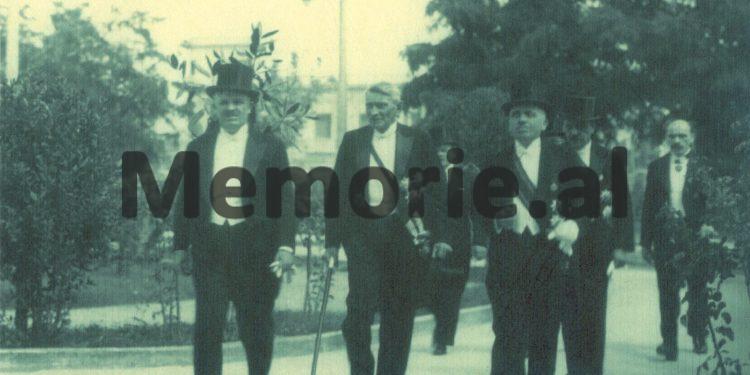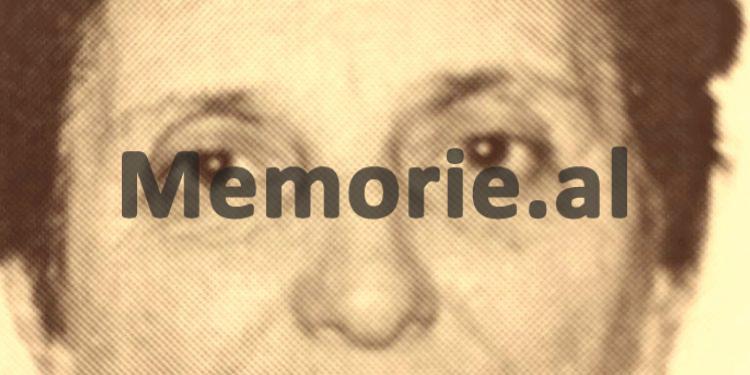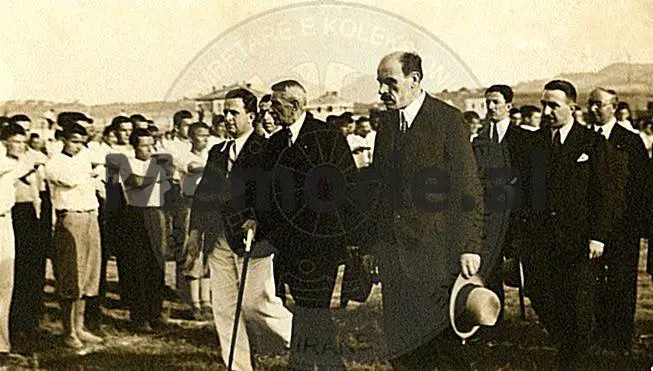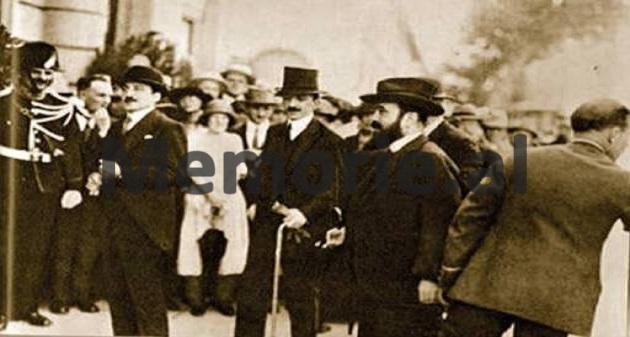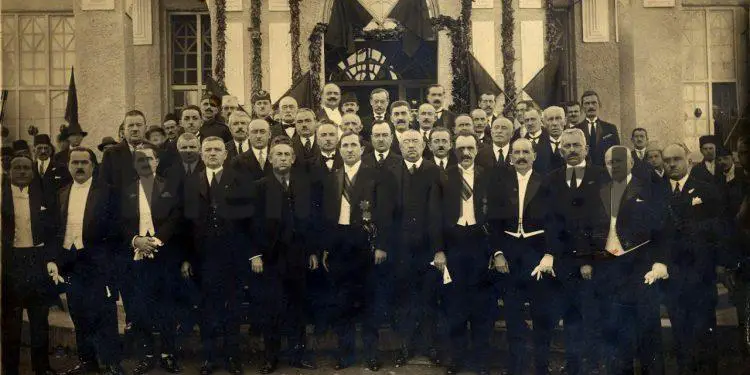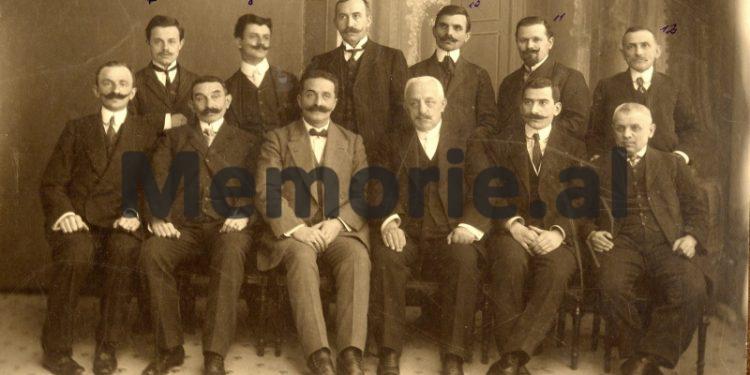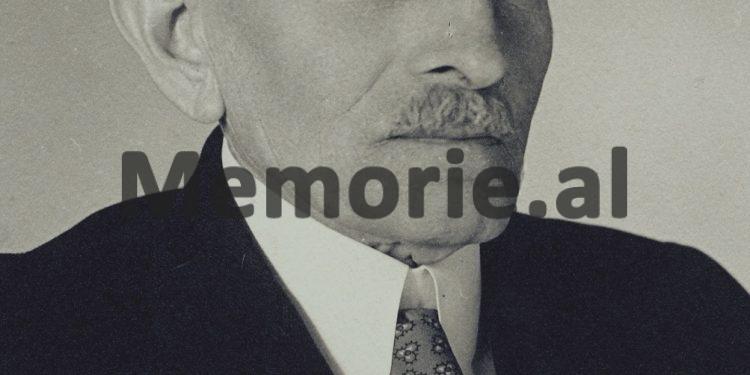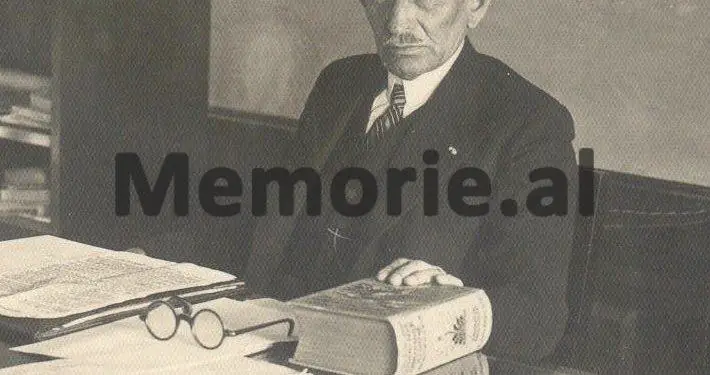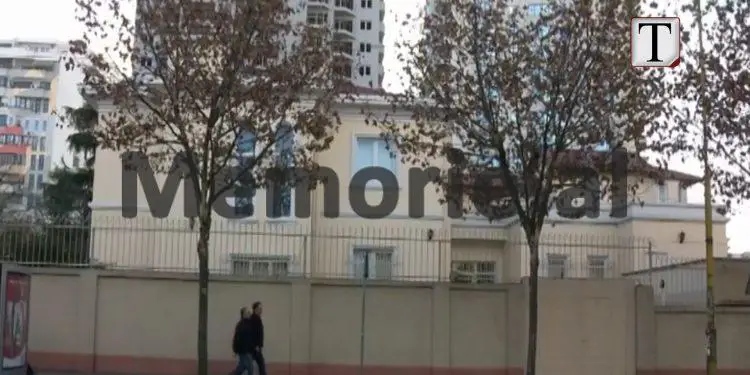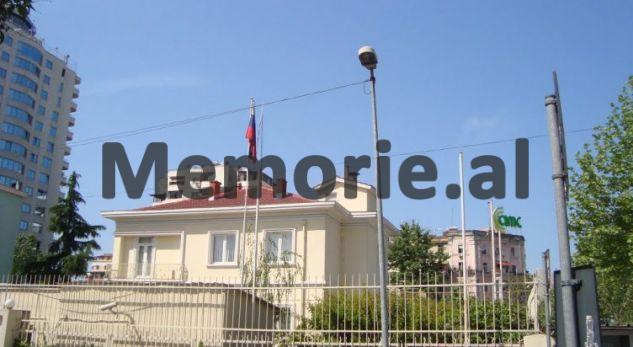Dashnor Kaloçi
Memorie.al publishes the unknown story of Pandeli Evangeli, former Prime Minister in three cabinets and Speaker of the Albanian Parliament for years in the period of the Zog Monarchy, told by his granddaughter, Donika Stasa Evangjeli, who testifies how her grandfather escaped her in 1947 by the partisan squad that came to arrest her and how the “uncle” temporarily saved his villa on the edge of Lana from seizure, after handing over all the documents and invoices stored since 1914. Mrs. Evangeli preserves in her family the personal archive of her grandfather, where there are dozens of letters and very rare historical documents, where, among other things, there is a rare letter of Bishop Fan Noli, sent to Pandeli Gospel on November 20, 1920, where it talks about the efforts he was making regarding Albania’s accession to the League of Nations.
100 years ago, on December 17, 1920, Albania was accepted as a full member of the League of Nations and the application for membership in that organization, which was sent to the Secretary General, Mr. Erik Drymond on October 12 of that year, was signed by the representative of the Albanian government, Pandeli Evangjeli, who at that time headed the Albanian delegation to the Paris Peace Conference. But who was Pandeli Evangjeli, what was his past and what functions did he hold throughout his political career in Albania? Regarding this personality of Albanian politics left in oblivion and denigrated by the communist regime before the ’90s, and almost very little known by historians and scholars, among others, speak best a series of documents and photos preserved with much toil and vicissitudes in the archive of the family of Mr. Vangjel Stasa, by his wife Donika, who is the granddaughter of Pandeli Evangel. In those multitude of documents, most of which are completely unknown and not even found in the State Archives, (in the Gospel correspondence with some of the most prominent personalities of that time), there is also a rare letter from Fan Noli, sent Evangelist. In addition to the publication of this letter, in the article we are publishing below, we are giving a short biography of the life of Pandeli Evangeli, which, in addition to the testimonies of his granddaughter Donika Stasa, is supplemented by documents from the archive of her family.
Who was Pandeli Gospel?
According to the documents kept in the family archive of Mrs. Donika Stasa, Pandeli Evangjeli was born in 1859 in the city of Korça, but the origin of his family is from the village of Shala in Kolonjë. He received his first lessons in his hometown and then went to the Greek gymnasium in the city of Korça. After graduating from high school, at the age of 19, Pandeliu emigrated to Romania, settling in the country’s capital, Bucharest. There he was hired by an Albanian businessman named Kostandin Eftimiu and soon came in contact with his childhood friends and other patriots, who worked for the benefit of the Albanian cause. In the city of Bucharest, Pandeliu became very active with the patriotic circles of the Albanians and thanks to the great work he did, in January 1896, his compatriots elected him president of the “Dituria” society. As the president of that patriotic association, in those years Evangjeli cooperated closely and had a regular correspondence with many of the patriots and personalities of the Albanian National Renaissance, such as Visarion Dodani, Jani Vreto, Asdreni, Nikola Naço, De Rada, Zef Skiroi, Edit Durham, Ibrahim Temo, Mehdi Frashëri, Mehmet Konica, Faik Konica, Ismail Qemali, Luigj Gurakuqi, Fan Noli, Sotir Kolea, sisters Qirjazi, Abdi Toptani, Jashar Erebara etc. Under the direction of Evangel, the company “Dituria” published primers and many other books that were distributed free of charge in some of the Albanian territories. Also, under the leadership of Pandeliu, the company “Dituria” strongly supported the opening of the first Albanian school in Korça and helped it financially. In those years Pandeliu also engaged as a publicist in the press of the time, publishing several articles under the pseudonym “An Albanian”. He became one of the initiators of the unification of the three societies, “Dituria”, “Shpresa” and “Drita”, in a single society, which took the name “Bashkimi”, where Pandeliu was elected vice president.
Meeting with Ismail Qemali in Bucharest
In 1912, shortly before the declaration of Independence, during his visit to Bucharest, Ismail Qemali met in person with Pandeli Evangeli, to whom he was handed a copy of the minutes of the meeting that took place with Albanian patriots at the hotel “Continental”. After the declaration of Independence, Pandeli Evangjeli sent to Ismail Qemali two packages of books, which contained all the legislation and regulations of the organization of the Romanian state, translated into Albanian, in the hope that they would serve for the organization of the new Albanian state. During his stay in Bucharest, Pandeliu married a Romanian girl named Maria, with whom he had only one son, Lionel, who graduated with a degree in Political Science in Paris. In 1913 Evangeli participated in the Congress of Trieste, where many Albanian patriots gathered to discuss the protection of the territorial integrity of Albania. At that congress, Pandeliu was elected secretary, along with Fuat Toptan. After a long activity for the benefit of the Albanian cause, in 1914 Pandeli Evangjeli answered the call of Prince Wid and returned to Albania, where the newly formed government offered him the post of Prefect of the Korça region. In 1917, as a result of the turmoil in the country, Pandeli returned to Bucharest, where he continued his patriotic activity. After the end of the First World War, Pandeliu went to Paris, where he participated in the Peace Conference, as chairman of the delegates of the Albanian Colonies of the USA and Romania. He stayed in Paris for two years at his own expense and in a letter, he sent to Pandeli Qirjazi at that time, among other things, he wrote: “I had many spoiled ones, but Shqipëria let Albania be saved, without all that I make them halal”. On October 12, 1920, on behalf of the Albanian government, Evangeli signed the request for Albania’s accession to the League of Nations. Later, in the parliamentary elections of March 1921, Evangjeli was elected deputy of Korça and from that time until April 1939 he has been continuously in the Albanian Parliament, and has held the highest functions: Speaker of Parliament, senator of Senate Speaker, Foreign Minister and Prime Minister in three government cabinets. He resigned as Prime Minister voluntarily in 1935, at the age of 76, and from then until April 1939 he served as Speaker of Parliament. With the invasion of the country by fascist Italy, he withdrew from political life and did not accept any honorific offer from the governments under occupation, rejecting even all invitations to official ceremonies.
The communists expelled the Evangelist from Tirana in ’47 “
What happened to Pandeli Evangjeli after the end of the War and how did the communists who came to power in December 1944 behave with the old career politician, who had served for almost 30 years at the head of the Albanian state, holding the highest, from that of the prefect, the deputy, the Speaker of the Parliament, the minister and the Prime Minister? In this regard, his granddaughter Donika Stasa (Evangel) testifies: “In the last days of the liberation of Tirana, the puffy face of our grandfather Pandeli was exposed, and he was overjoyed when he learned that the German invaders had fled the country. and Albania was free. But when only a few days had passed since the end of the War, in our house on the edge of Lana (the big villa where the Russian embassy has been in recent years), some partisans came to him and demanded that Pandeli be arrested. My father Lionel told them that his father, Pandelius, was very ill and could not move and, if he could, he was willing to go with him instead of his father. But the partisans did not pay any attention to the words of my father, Lionel, who was told to immediately carry out their order, that is, to take my father out the door. But, fortunately, in those moments when those discussions were taking place, a partisan named Bule passed by, who, apparently, had a lot of influence and responsibility, as all the partisans immediately honored him with their ready attitude. Bulja addressed the partisans, saying: “What are you doing? “Leave him alone, because I will talk in command.” After the words of Bule, who called Pandeliu “uncle”, as our grandfather was called as a sign of respect by all, the partisans left and he escaped arrest. But just a few days later some other partisans came to our house again, who handed us the sequestration order that had been given for our house, warning us that for two days we had to leave from there without taking anything with us. That sequestration order, as far as I can remember, was for those who had placed illegal assets during the War period. But after that order, our grandfather took out all the documents and invoices that he had carefully kept since 1914, when he had come from Romania to Albania, calculating all the expenses incurred. After that, the order for sequestration of our house was canceled and we were allowed to stay in Tirana. But even that stay did not last long, because in 1947 my grandfather was expelled from Tirana and he was forced to move to the city of Korça, taking refuge with his relatives, in the Ballauri family. He did not live long in that city, for in 1949, at the age of 90, he passed away. Only a handful of people attended his funeral, as we were considered bourgeois families. Even in the years that followed our family suffered class warfare and my father, Lionel, who had a degree in Political Science in Paris, was never allowed to work in education as a French teacher. The reason for this was not only the biography of our family and the fact that the father had served for many years during the period of the Zog Monarchy, as the third secretary in the Ministry of Foreign Affairs, but the constant requests made to him to hand over the personal archive of the family ours. “Even though his father made it a condition that he be allowed to work in education, he did not hand over the archive, which is still kept in our house as a treasure of great value.”
Noli’s letter: Lord Robert Cecil brought Albania to the League
ALBANIAN DELEGATION OF THE LEGAL NATIONS.
Hotel Monopole. Geneva, November 20, 1920.
Dear friend and son with Christ
I received all the telegrams, letters and peace with books and memoranda and thank you for the speed with which you sent them to me. Your speed in response and work on the one hand made me longing, but on the other hand it made me realize that you and your friend Gega, from long exile in foreign lands, have been deported to such an extent that abhor the sacred habit of Albania, which loves everything sluggishly, sleepily and finally completely forgotten. As your iti with Christ, and especially now that I have in hand the documents of your sin, please note that haste is the work of the devil and that the goat must always be pursued and occupied with the Arabs.
One sentiment, which infuriates us immensely with the two of you, is that you have not yet clashed. What are you doing then, what are you waiting for? What are these habits that you import us? Do not say in the name of God, that you will destroy our Albania with these insurgent ways.
These are enough for now, but when we are done I will tell you at length, that I am so alarmed by the crooked path that has occupied us, after finishing my mission in Geneva, I will come to Paris to I give you some tips on the integral preservation of our ancestral habits.
In the meantime, let me tell you what happens here:
Albania’s access was put on the agenda of the League meeting, after Lord Robert Cecil stepped on it, and some delegates wanted to put our search in the basket, because he had arrived at the secretariat after October 15… England is indifferent and Italy quite cold. France has warmed up and laughed since Venizelos fell. A senior secretariat official and Clemenceau’s intimate and trusted friend did the job for us and told us that out of the two bans on Albania’s entry into the League, Greece was completely eliminated and Yugoslavia nofta will not oppose much. Senator Hafa Saine, the Belgian delegate, whom I know from America, told me with a certainty which I wish to be as grounded as he remembers, that Finland and Albania would approach without much negotiation. I begged him to remind me, for I was afraid they would lie to us in a row.
I was shocked. Switzerland welcomes us, Professor Pitard and Du Bochet, editor at the Journal de Geneve, work among the Helvetian delegates; former President Motta was the first to return the visit; we will see it these days. Spain and the Latin American republics sympathize with us. Even the unexpected thing, Japan catches our eye! Of all this, although I am very pessimistic, I telegraphed you the words “success probable”, which you please interpret as follows: “Can Safi enjoy us with a pleasant joke!”. now some positive things: P’s work (not read / my note, DK) will be discussed by a committee mother mr. Robert Cecil, who is in a good mood without us; how to make the report this commission before the meeting of the league in favor or against, Senator Lafontaine of Belgium, will take our side with a word my Albania, which will be prepared together, after this will turn Sir Said Ali Imami of India , which dot ‘was sharpened tomorrow to protect the Illyrian din-kardash; let a hot Catholic of Spain, Chile, Argentina, or all three of them hold the bass; If Bar Hayashi from Japan participates in this tavatur, which I will see tomorrow at least Phya Buri Tavarasthi i Sramit, the concert will become so delicious that I will write satisfied from Geneva, even if they do not approach us , that we finally learned to knock on deaf doors. As you can see, from the news we gave you by telegrams and with this letter, there is no doubt that I also started to break the sacred habit of Albania, and this reminds me of the well-known saying: “When you have sinful friends, it is always danger to catch their disease”.
Fortunately, I have so little time to put it back on the writing floor, so I will ask you to sing it from now on with telegrams which I will not spare you, as soon as I have important news. / Memorie.al
Blessings and greetings
Bishop Theofan




